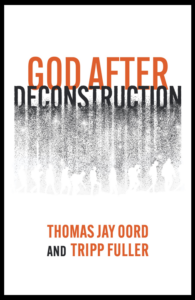After Certainty and Absolute Mystery
In our book God After Deconstruction, Tripp Fuller and I explore the problems of both certainty and absolute mystery. The loss of certainty is common among most deconstruction stories. But the alternative — absolute mystery — makes almost as little sense.
Our experience and the experiences of others—in multifarious forms—provide reasons to believe in God. We can think a Valuer, Nudger, Artist, or Companion exists. But we can’t be certain. After all, God’s existence isn’t obvious. We believe life contains meaning, although we can’t be 100% sure. The purpose of existence hasn’t been boxed up, labeled, and dropped from God’s Post Office.
It’s best to think about life as an adventure. But to believe in God on this adventure doesn’t mean we have to think one idea about God must be just as good as another. Not all theologies are equal.
The Journey
We’re on an adventure side by side with others. We draw from the past, but we should be able to criticize what seems unhealthy, too, especially bad views of God. We embrace truths of the present also; contemporary experiences matter. These will include interpreting aspects of truth, beauty, goodness, and love in our personal and social relations. Adventurers move into an open future. Our quest faces multiple possibilities.
Some days, we see ourselves perched atop a muscular stallion, confidently planning our route, boldly facing life in its complexities. Other days, we may feel dragged behind that steed, able only to make fleeting decisions as we bump along rocky terrain. Adventures will naturally have peaks and valleys, want and excess, calamities and celebration.
Our reason-and-experience-based trust in God can provide a compass for this journey. We need a sense of direction, after all, to make progress. This compass doesn’t show a detailed route; it points toward undiscovered horizons.[1] We navigate in response to the influence of God, fellow travelers, the nonhuman terrain, and our deepest intuitions.
Believing in God won’t be a security blanket, and God won’t be the tour guide of a pre-selected schedule. Our lives become an expedition in choice and surprise; we’re not trapped on a pre-programmed river cruise, unresponsive to our needs and curiosity.
Life after deconstruction can become a free and open, moment-by-moment adventure.
For more on how we see the adventure of God after deconstruction, see the book at this link.
[1]. On God knowing the future as possible but not actual (open theism), see Gregory Boyd, God of the Possible (Grand Rapids, MI: Baker, 2000); Thomas Jay Oord, Open and Relational Theology (Grasmere, ID: SacraSage, 2021); Clark Pinnock, et. al., The Openness of God (IVP, 2004); Richard Rice, The Future of Open Theism (Downers Grove, IL: IVP 2020) and God’s Foreknowledge and Man’s Free Will (Wipf and Stock, 2004).


Comments
Dr. Oord, I have been curious after listening to hours of interviews, lectures and debates you’ve done over the years as to your stance on Christ. Jesus almost never comes up. It seems as though Jesus, his life and teachings would be the crucial model of a lived out Open-Relational philosophy. Do you address this in your written work? A thought occurred to me when listening to a presentation you did for Loyola: if a person came to you and told you they wanted to become a Christian, how would you respond? Thank you for your time
Good to hear from you, Bryon. I address Jesus and related issues in The Uncontrolling Love of God and in Pluriform Love. I’ve also written several published articles. But I do need to write a full monograph on Jesus!